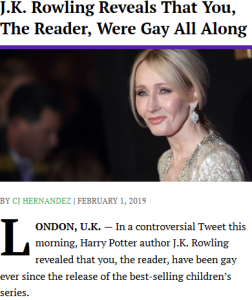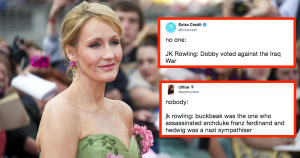Are Current J.K. Rowling Memes Chasing Away New Readers?
Ever since the release of Fantastic Beasts: The Crimes of Grindelwald, the world has not been kind to J.K. Rowling. From the ashes of pessimistic fans and disgruntled, vaguely involved moviegoers erupted an unwarranted attack on the reputation of the Harry Potter author. The new film, along with Pottermore’s random tweet of wizards using the bathroom in the Middle Ages and J.K. Rowling’s comments on Albus Dumbledore and Gellert Grindelwald’s relationship, caused the public to seize misleading information and run with it. Internet memes are extending and feeding the negative preconceptions that are now attached to J.K. Rowling.
As a teacher, I have used Potter as a way to connect with students. Furthermore, I’ve successfully based my classroom management on a House point system. The first half of the year was met with the promise of a few high schoolers willing to give Potter (and reading) a try. My fervent passion for Potter and my justification for infusing it into my English classroom have always been solidified by the series’ beautiful focus on ethical choices, friendship, loyalty, and – of course – J.K. Rowling’s inspirational story and characters. I have been met with several questions regarding my emphasis on Potter due to the religious beliefs of parents. The tiny community that I work in has been speculative of the value of Potter, and they are concerned about the moralistic integrity of the material. In the past, I always had J.K. Rowling’s charity work and generous donating as a reference to reassure others.
Now, however, the conversation has shifted. Students and parents who have never read the series are coming into conversations armed with information about J.K. Rowling they’ve retrieved from memes. I’m not a person devoid of humor, but the Internet culture has turned fans into Blast-Ended Skrewts. The memes are a problem on many levels. Students are asking questions such as “Isn’t J.K. Rowling that bad author?” or “Aren’t all the characters in Harry Potter gay?” Such questions don’t elicit the deep conversations I used to have about the series. Instead of young people slowly being exposed to characters and storylines that advocate tolerance, they immediately make these matters trivial with the following memes:
I didn’t even include the lewd panels that depict J.K. Rowling as a crack-like addict, tweeting extra Potter information. Since when was Dumbledore’s sexuality novel news? The “bombshell” was dropped years ago. Although gay characters shouldn’t be a taboo subject like they used to be, it’s still, unfortunately, not the best opening advertisement for several families who are unsure about Potter in the first place. Potential readers and the LGBTQ+ community risk being demeaned by memes that paint over issues with a resentful brush. Despite Rowling saying that she doesn’t want to focus on the sexual aspects of Dumbledore’s relationship, it has somehow become popular to claim she’s some sort of loose cannon, ruining the fandom and characters with declarations of sexuality. I know many people have been frustrated with her extra story elements post Potter, but that’s no reason to treat the person who created the content in the first place in such a deplorable manner.
The hate for her has reached new peaks in the dark corners of the Internet and has trickled into the mainstream. Why are so many people jumping on this bandwagon? Do they feel personally attacked by her maintaining control of a world she created? Do they, like entitled children, feel they didn’t get things their way with Crimes of Grindelwald? Yes, I’ve been speculative of many elements of the film, but I have always been grateful that there’s a film to be critical of in the first place. I cannot express my gratitude enough to the woman who saved me multiple times throughout my life and guided me through a story of courage, hope, and love. She has affected so many people in the world in a positive way. We shouldn’t forget that as a fandom. I sincerely want to continue promoting the Potter series in the hope that others feel the same inspiration I did. It’s well known that Potter taught a whole generation to read – and keep reading. Don’t we want the same for the next generation? Especially in this lull where a popular book series hasn’t risen to catch teens’ interest in a while?
And yet I’m met with many young people showing me these memes that make my skin crawl because they’re related to a subject my students know I champion. Each time I see the continued derailing of J.K. Rowling’s good name, I fear the series will become a joke to future readers before they even turn a page. And in turn, my own character will be questioned as a teacher due to the artificial judgment that comes with this abrupt societal shift.




